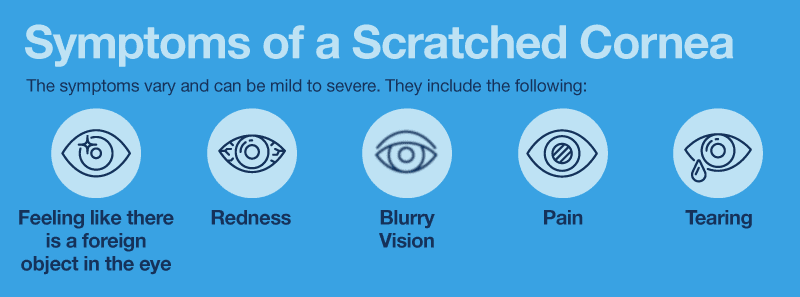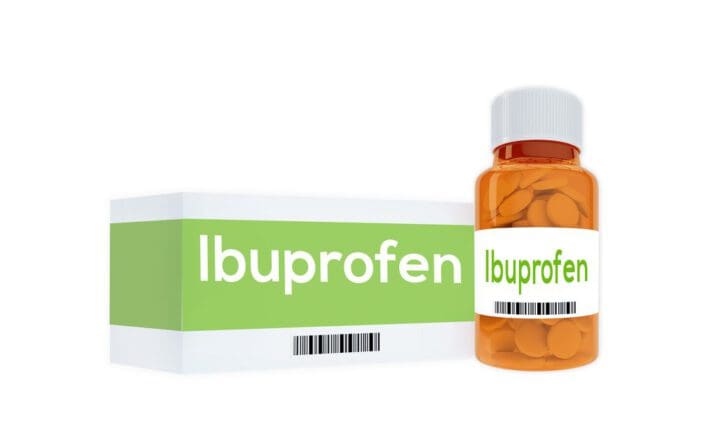How to Tell if You Have a Scratched Cornea (& What to Do)
Home / Eye Conditions & Eye Diseases /
Last Updated:
Experiencing symptoms like blurry vision, eye pain, or light sensitivity? These could be signs you need to learn if you are worried about how to tell if you scratched your eye. Prompt medical attention is essential for diagnosis and treatment to minimize discomfort and prevent further complications
Table of Contents
If you experience burning, pain, blurry vision, redness, headache, or a feeling of grittiness in your eye, it may be a scratched cornea.
Attempt to flush your eye with water and blink repeatedly in an effort to remove any debris from the eye. Don’t rub or touch your eye, and don’t attempt to remove anything from your eye with your hands. See an eye doctor promptly.
What Is a Scratched Cornea?
A scratched cornea (also termed corneal abrasion) is a scratch that occurs on a superficial level on the cornea, which is the clear, protective layer or “window” located at the front of the eye.
A corneal scratch can occur quite easily and from seemingly innocuous causes, such as dust particles, dirt, sand, environmental debris, wood chippings or shavings, and other materials. Even the edge of a piece of paper can cause one.
You deserve clear vision. We can help.
With 135+ locations and over 2.5 million procedures performed, our board-certified eye surgeons deliver results you can trust.
Your journey to better vision starts here.
Corneal abrasions are extremely common and make up around 10 percent of emergency eye care visits. Scratched corneas are among the most common kinds of eye injuries.

Scratched Cornea Symptoms
Corneal abrasions can present a variety of problems and symptoms. Symptoms of a scratched cornea include the following:
- Pain in the area of contact
- Blurred vision
- A gritty sensation in the eye
- Tearing or watering of the eye
- Redness or discoloration
- Light sensitivity to either natural or artificial light
- Headaches
In most cases of a scratched cornea, the eye will end up healing on its own.

It may be helpful to wear sunglasses when outside while experiencing scratched cornea symptoms. Wearing sunglasses will often reduce or eliminate symptoms, especially those related to light sensitivity.
Generally, a minor scratched cornea will heal itself within a few days. However, if there is a foreign object in the eye that cannot be removed, surgical intervention may be necessary.
When to See an Eye Doctor
It is necessary to seek medical treatment if you experience prolonged pain and discomfort as well as compromised vision related to a scratched cornea. Even if you believe your cornea scratch is minor, it is best to have your eye checked out by an eye care specialist in order to avoid any adverse risks and get the treatment you need to see clearly and comfortably again.
When seeing a vision care specialist, you will be given an eye exam where your eye doctor will investigate any damage. Your eye doctor will also remove any particles or debris and check your overall vision.
An eye doctor may also apply or prescribe antibiotic ointment or pain relievers if applicable. Surface abrasions and scratches will typically heal within a few days. Larger abrasions and scratches may require bandage contact lenses to promote healing and provide additional protection to the eye.

Causes of a Scratched Cornea
More often than not, cornea scratches are caused by impact or trauma. Getting poked in the eye by a finger or object can commonly lead to a scratched cornea. Rubbing the eye when there is dust or debris in the area can also cause a scratched cornea.
Risk Factors
Risk factors that may increase an individual’s chances of getting a scratched cornea have to do with being in certain environments and engaging in activities where eye injuries commonly occur.
Factory and lab settings that require individuals to wear protective eyewear pose an increased risk of eye injuries as do certain extracurricular activities like football and hockey.
Wearing protective eyewear, including sports goggles, and observing any safety precautions associated with specific environments and activities will help to reduce an individual’s risk of experiencing an eye injury.
You deserve clear vision. We can help.
With 135+ locations and over 2.5 million procedures performed, our board-certified eye surgeons deliver results you can trust.
Your journey to better vision starts here.
Diagnosis
Minor scratched corneas can often be self-diagnosed based on symptoms, such as pain in the affected area and compromised vision.
Consulting with an eye doctor is the best way to get an accurate diagnosis and receive proper treatment that will minimize discomfort and promote a speedy recovery.
Scratched Cornea Treatment
Treatment for corneal abrasions will vary depending on severity. Most corneal scratches will heal within one to three days after the injury.
Eye doctors often prescribe medication as a means to prevent bacterial infection. Ophthalmic antibiotic drops or ointments are generally prescribed to keep the area free from issues. These medications also help to relieve spasms and pain.
As your eye begins to heal, it’s important to avoid rubbing your eye. Don’t wear contacts until your eye doctor advises that it is safe to do so. Wear sunglasses to ease any sort of discomfort caused by viewing direct light (whether artificial or sunlight).
Deep scratches can cause infections and scarring, so it’s important to follow your eye care specialist’s recommendations to ensure an effective recovery and to avoid permanent vision loss. If you notice any changes in the healing process, such as worsening symptoms, call your doctor.
Prevention
Wearing protective eyewear is the best way to avoid a scratched cornea. If you are entering an environment or engaging in an activity that requires eye protection, it’s important to observe any safety precautions that are applicable.
Safely Removing Eye Irritants
If you have debris in your eye, follow established guidelines for successful removal. Do not rub your eyes, especially if they have become irritated.
First, try blinking repeatedly to loosen any debris in the eye. Blinking can often assist in dislodging dirt, dust, and debris. You can also try rinsing with a saline solution or flushing the eye with clean water in order to remove any eye irritants.
If you cannot remove the foreign substance from your eye, it’s important to visit an eye care specialist as soon as possible. A doctor will use special tools, including a specialized dye that will help identify surface scratches or cuts. In rare cases, surgery may be necessary to remove the foreign object from the eye.
Recovery Time
Corneal irritability will vary from person to person. Minor eye scratches will generally heal within one to three days as long as an infection does not occur. Depending on the severity of the cut, individuals may need extra time for the eye to heal fully and normal vision to be restored.
Most scratched corneas do not result in permanent vision loss. Individuals who recover from a scratched cornea will generally experience restored vision within a few days, although pain and discomfort may extend beyond this timeframe.
One of the primary benefits of utilizing an experienced eye care specialist is that you will receive treatment at the time of injury as well as any applicable aftercare to ensure a full and speedy recovery.
If you don’t see an eye doctor for a scratched cornea, it can lengthen your recovery time, increase the likelihood of infection, and pose an unnecessary risk of experiencing permanent vision loss. It’s better to err on the side of safety, and see an eye doctor promptly after any injury or accident.
You deserve clear vision. We can help.
With 135+ locations and over 2.5 million procedures performed, our board-certified eye surgeons deliver results you can trust.
Your journey to better vision starts here.
References
- Corneal Abrasion. (July 2022). StatPearls.
- Traumatic Corneal Abrasion. (April 2019). Cureus.
- Corneal Abrasion. (February 2013). Nursing 2022.
- Evaluation and Management of Corneal Abrasions. (January 2013). American Family Physician.
- Corneal Abrasion: Assessment and Management. (September 2013). Royal College of General Practitioners.
- Early Treatment of Corneal Abrasions and Ulcers–Estimating Clinical and Economic Outcomes. (September 2022). The Lancet.
This content is for informational purposes only. It may have been reviewed by a licensed physician, but is not intended to serve as a substitute for professional medical advice. Always consult your healthcare provider with any health concerns. For more, read our Privacy Policy and Editorial Policy.
